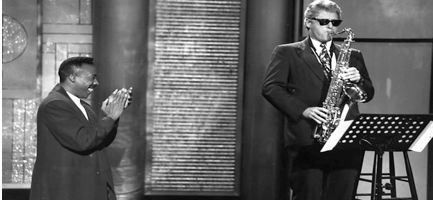CommentsSOUTH OF THE 10--Although this is not breaking news, it still shocks me. The Clinton family came to the national attention of Black families in 1992 thanks to the Arsenio Hall Show. Then Arkansas Governor Bill Clinton started blowing his saxophone on the popular night time talk show and we were hooked. Black folks dubbed him our “First” Black president.
After winning in 1992, President Clinton signed two laws into effect that have negative repercussions for Black families. The Personal Responsibility and Work Opportunity Reconciliation Act of 1996 (PRWORA) which placed limits on how long a mother could receive welfare benefits and the The Violent Crime Control and Law Enforcement Act of 1994 led to the creation of “three strikes”.
Decades later, on Wednesday, July 15, 2015, former President Bill Clinton apologized to Black people for his role in the mass incarceration of Blacks.
Today, at least a half dozen Black men are lined up to be delegates for his wife’s bid for the White House.
Bill Clinton said Wednesday that the crime bill he signed into law as President in 1994 worsened the nation's criminal justice system by increasing prison sentences.
"I signed a bill that made the problem worse," Clinton told an audience at the National Association for the Advancement of Colored People's annual meeting in Philadelphia. "And I want to admit it."
According to the NAACP, African Americans constitute nearly 1 million of the total 2.3 million incarcerated population, and have nearly six times the incarceration rate of whites.
The Department of Justice paints an even grimmer picture. Approximately 12–13% of the American population is African-American, but they make up 35% of jail inmates, and 37% of prison inmates of the 2.2 million male inmates as of 2014 (U.S. Department of Justice, 2014.)
Candidates wishing to be delegates for the 2016, are self-promoting on social media, hoping to garner support at the polls May 1.
So, what do delegates do?
Odest Riley Jr. says the role of the delegate is to vote at the Democratic National Convention, the sentiments of the residents who elected them.
Millennials will play a large role this election cycle.
Brent Dominic Page, managing partner at the consulting firm Millennial Government Affairs, tells 2 Urban Girls: “It is important for Millennials to vote this election cycle because there is a lot at stake. Millennials are facing a contracting economy with little job opportunity. While there are no job opportunities they are forced into over $1 trillion in student loan debt. Millennials have the greatest political potential but a lot to lose. In this election Millennials will be a huge driving force at the polls. In 2012 23 million millennials voted so we expect to see an increased number for the 2016 general election.”
Many millennials were integral in the passage of Proposition 47 due to their families being in prison on petty charges.
The male candidates don’t fit the criteria and are not affected by Clinton’s crime bills but possibly know of someone in their community who is.
With the 43rd Congressional District being home to some of the most underserved, poverty stricken people, the message being sent is, since those laws don’t pertain to me, then Hillary’s cool.
It will be interesting to see how the delegates selected will be able to look other Black people in the face and sell Hillary Clinton as the person we need for our next President.
(Melissa Hébert is an alumni of California State University Dominguez Hills with a degree in Political Science and a member of LAAAWPPI. She is the editor-in-chief of blog 2urbangirls.com and host of the Urban Girl Show. Melissa is also President of School Site Council in Inglewood Unified School District and is the mother of two handsome sons. She can be reached at [email protected]) Prepped for CityWatch by Linda Abrams.
Sidebar
Our mission is to promote and facilitate civic engagement and neighborhood empowerment, and to hold area government and its politicians accountable.

 CityWatch Los Angeles
Politics. Perspective. Participation.
CityWatch Los Angeles
Politics. Perspective. Participation.
06
Fri, Feb















